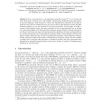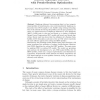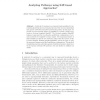AB
2007
Springer
15 years 6 months ago
2007
Springer
Lie group theory states that knowledge of a m-parameters solvable group of symmetries of a system of ordinary differential equations allows to reduce by m the number of equations. ...
116
click to vote
AB
2007
Springer
15 years 6 months ago
2007
Springer
Given a permutation , the application of prefix reversal f(i) to reverses the order of the first i elements of . The problem of Sorting By Prefix Reversals (also known as pancake ...
116
click to vote
AB
2007
Springer
15 years 6 months ago
2007
Springer
Abstract. Haplotype inference from genotype data is a key computational problem in bioinformatics, since retrieving directly haplotype information from DNA samples is not feasible ...
112
click to vote
AB
2007
Springer
15 years 8 months ago
2007
Springer
Whenever a programmer writes a loop, or a mathematician does a proof by induction, an invariant is involved. The discovery and understanding of invariants often underlies problem s...
125
click to vote
AB
2007
Springer
15 years 8 months ago
2007
Springer
Abstract. A network of reactions is a commonly used paradigm for representing knowledge about a biological process. How does one understand such generic networks and answer queries...
128
click to vote
AB
2007
Springer
15 years 8 months ago
2007
Springer
Abstract. In 1973 R. Thomas introduced a logical approach to modeling and analysis of bioregulatory networks. Given a set of Boolean functions describing the regulatory interaction...
139
click to vote
AB
2007
Springer
15 years 8 months ago
2007
Springer
We introduce a novel model construction, cascaded games, that is intended to allow us to study the notion of steady states algebraically and structurally. The model construction is...
143
click to vote
AB
2007
Springer
15 years 8 months ago
2007
Springer
A series of papers, all under the title of Algorithmic Algebraic Model Checking (AAMC), has sought to combine techniques from algorithmic algebra, model checking and dynamical syst...
130
Voted
AB
2007
Springer
15 years 8 months ago
2007
Springer
What is systems biology? What can biologists gain from an attempt to algebraize the questions in systems biology? Starting with plausible biological theses, can one algebraically m...
122
click to vote
AB
2007
Springer
15 years 8 months ago
2007
Springer
We present SpiCO, a new modeling and simulation language for systems biology. SpiCO is based on the stochastic π-calculus. It supports higher level modeling via multi-profile con...



